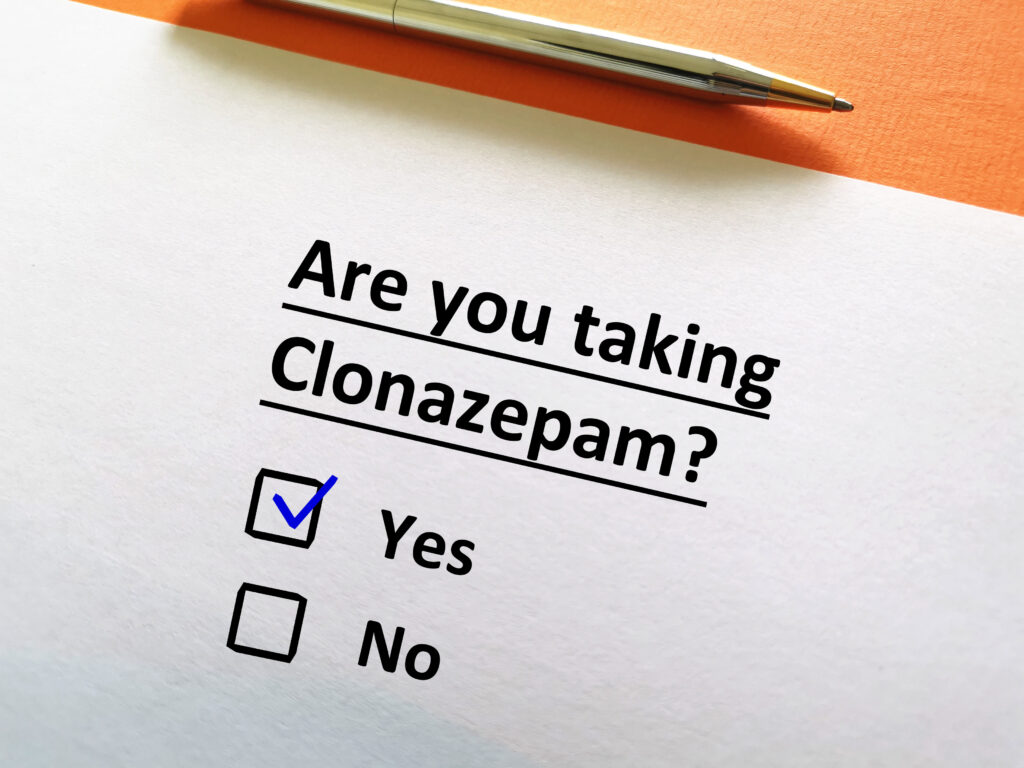What is Klonopin?
Clonazepam (Klonopin) is a long-acting benzodiazepine used to treat panic disorders, several types of seizure disorders, insomnia, muscle spasms, and alcohol withdrawal. Benzodiazepines work by inhibiting certain neurotransmitters in the brain which slows the body’s response to stimuli. Klonopin comes in tablets and disintegrating tablet forms, but can be crushed and snorted when they are abused. It suppresses the Central Nervous System (CNS) and produces a “euphoric” feeling often followed by a hazy, relaxed feeling. Slang terms for klonopin include Benzos, Downers, K-pins, and Tranks. Klonopin carries a Black Box warning because of the risk of sedation, coma, difficulty breathing, risk of addiction, and increased risk of suicidal thoughts or actions. The use of opioids while taking klonopin greatly increases the risk of life-threatening side effects. Talk to your doctor about all medications you take prior to taking Klonopin to avoid potentially harmful drug interactions.

Klonopin Effects
While Klonopin is very effective for a variety of conditions, it has a high potential for abuse and is not recommended for long term use. Effects of klonopin can include:
- Lightheadedness
- Drowsiness
- Changes in sexual desire or functioning
- Unsteady gait or problems with coordination
- Blurred vision
- Memory problems
- Increased urination
- Joint or muscle pain
- Increase in saliva
Signs of Klonopin Abuse and Addiction
Signs of klonopin addiction or abuse may be hard to identify as it is usually prescribed by a physician, however, being aware of potential signs of abuse can help save a life. Signs of addiction or abuse include:
- Vertigo
- Decreased libido
- Confusion
- Impaired reaction time
- Impaired judgment
- Numbness
- Confusion and impaired cognition
- Developing a tolerance to klonopin
- Taking more than prescribed to achieve the same effect
- Continued klonopin use despite it negatively affecting their life
- Difficulty maintaining employment
- Loss of interest in things once enjoyed
- Legal troubles
- Trouble managing money
- Mood swings
If you experience any of the following symptoms, call your provider or seek medical attention immediately:
- Difficulty breathing
- Rash or hives
- Difficulty swallowing
- Swelling of face, mouth, or tongue
Klonopin Withdrawal Symptoms
Withdrawing from klonopin can cause dangerous side effects and you should not stop taking it without first speaking to your doctor. They will develop a plan to help you safely taper off the medication to avoid experiencing withdrawal. Klonopin is a long-acting medication, meaning it stays in the body for 18-50 hours, so withdrawal can take a couple of days to kick in and may last up to 90 days to wear off. Depending on the dependence on the drug, duration of use, and overall health of the person taking the medication, withdrawal symptoms can include:
- Panic attacks
- Elevated heart rate
- Hallucinations
- Fever
- Difficulty with coordination
- Nausea or vomiting
- Anxiety
- Sweating
- Irritability
- Seizures
- Coma
- Death
Long Term Side Effects of Klonopin Abuse
Long term side effects can be potentially dangerous and unpleasant, so it is imperative to work closely with your provider to ensure the benefits of use outweigh possible long term effects. Long term use has been associated with:
- Insomnia
- Overdose
- Poly-drug abuse
- Infection
- Withdrawal
- Drowsiness
- Birth defects in unborn babies
- Difficulty concentrating
- Depression
- Antisocial behaviors
- Confusion
- Irritability, hostility, or aggression
- Vertigo
Klonopin Addiction Treatment
Addiction treatment takes a multifaceted approach to care, by combining emotional and physical therapies to treat the “whole” person. Sometimes prior to treatment, you will go through a medically supervised detox, where you will be monitored by doctors and nurses to ensure your safety. There you can receive medication to decrease withdrawal symptoms and they can monitor for potential complications. After that you can attend inpatient or outpatient addiction treatment to help you on your road to recovery.
Inpatient addiction treatment requires you to live at the facility while you receive treatment, usually one to three months. During that time you will receive a wealth of emotional and behavioral therapies to help you identify the root causes of addiction and learn new ways to cope. Leading edge trauma therapies are also utilized to help quickly and effectively process traumatic life events that may have contributed to the addiction. Depending on the severity of addiction, once inpatient is complete, it is often recommended that an outpatient program is continued. This allows continued support and self growth during the time that is usually most difficult (returning home and back to “normal” life). If you or a loved one would like more information about klonopin addiction, the addiction specialists at Novo Detox are available 24/7 to take your call.




